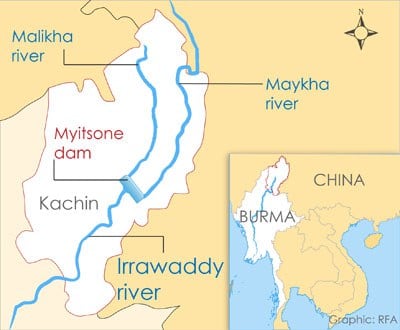A Chinese dam project being built on Burma's Irrawaddy River is not safe and could destroy the country's critical rice sector, warns pro-democracy leader Aung San Suu Kyi, calling for a review of the mega project.
She has joined environmentalist and ethnic groups in publicly opposing the multibillion dollar project undertaken by China Power Investment Corp. in northern Kachin state.
An environmental impact assessment report has generated "intense concern," particularly with regard to the safety aspect of the Myitsone Hydro Electric Project, a joint Burmese-Chinese venture involving eight dams, she said in a two-page statement of appeal.
"The presence of fault lines in the vicinity of the dams and the sheer immensity of the reservoir raises the specter of horrendous devastation in the event of an earthquake," she said.
Another downside to such a project is the "serious problem" from a weakened flow of the waters of the lrrawaddy—the intrusion of salt water into the delta, the 66-year-old Nobel laureate said.
"This is detrimental to paddy production and thus affects the whole population of the country for whom rice is the staple food," she said. "Moreover rice is one of our major export items, and any decrease in its production could affect foreign exchange earnings."
Sixty percent of Burma's rice is cultivated in the Irrawaddy delta.
Meanwhile 12,000 people from 63 villages have been relocated due to the project and Aung San Suu Kyi said it is not yet clear whether they will receive compensation commensurate with the loss of their livelihoods and the disruption to their traditional way of life.
'Undesirable consequences'
She pointed out that although large sums of money have already been spent on the project, it should be reassessed.
"We would urge that in the interests of both national and international harmony, concerned parties should reassess the scheme and cooperate to find solutions that would prevent undesirable consequences and thus allay the fears of all who are anxious to protect the Irrawaddy."
"[K]eeping in mind the interests of both countries, both governments would wish to avoid consequences which might endanger lives and homes."
Aung San Suu Kyi's appeal statement is seen as another step to reassert herself into a dialogue involving the country’s major issues following her release from house arrest in November last year.
Recently, she wrote an open letter addressed to the government and armed ethnic groups calling for renewed efforts to achieve a nationwide ceasefire.
On Sunday, she will make her first political trip outside her Rangoon home city since she was freed.
Describing the Irrawaddy as the "most significant geographical feature of our country," she appealed to environmental experts and conservationists to help create a worldwide awareness of the dangers threatening "the great river."
"Together we can find solutions to problems, ecological, economic, technical, and political, related to the Irrawaddy."
Chinese study

Green groups say that construction of the dam project, begun in 2010, will cause serious social and environmental problems and directly affect people living both upstream and also far downstream.
An environmental impact assessment, fully funded by the Chinese company and conducted by a team of Burmese and Chinese scientists, said that the dams will threaten the biodiversity of the local ecosystem, as well as impact millions of people who depend on the Irrawaddy River for their livelihoods.
A copy of the report was obtained by Thailand-based Burma Rivers Network, which said the Chinese firm had ignored its own study conducted in 2009. The findings of the environmental assessment were never made public.
The armed ethnic minority group Kachin Independence Army (KIA) has expressed its objection to the project to both the Burmese and Chinese governments. The KIA is currently engaged in armed clashes with Burmese government forces, which started in June near another Chinese-built hydropower plant in Kachin State.
"Since the commencement of the Myitsone project, the perception, long held by the Kachin people, that successive Burmese governments have neglected their interests has deepened," Aung San Suu Kyi warned.
But Burma's state media said the project would have no negative effect on the flow of the Irrawaddy, which starts in Kachin state at the confluence of the Maykha and Malikha rivers and follows a steady course to the south, where it disperses into a network of streams and rivulets before finally flowing into the Indian Ocean.
The dam project will create job opportunities for locals and "have no adverse effects whatever on the agriculture, business and social work," a commentary in the Myanmar Alin newspaper said.
It said the Myitsone Dam, the largest of the proposed dams, will utilize only 7.6 percent of the Irrawaddy's flowing waters.
Aung Din, the executive director of the Washington-based U.S. Campaign for Burma, believes the total estimated cost of building all the dams and hydroelectric development projects is about U.S. $20 billion.
He accused China of being "the most aggressive" foreign investing nation in Burma, saying it "is sucking the country’s blood everywhere it can set foot."
Centuries-old evergreen forests in Kachin and Shan States have been rooted out by Chinese logging companies, he said. In addition, he said, many mountains are being destroyed by Chinese mine companies searching for gold, copper, sapphire, and jade.
Aung Din said the Chinese government should stop the dam project and "destroying" the Irrawaddy "before the growing anti-Chinese sentiment among the people of Burma dangerously explodes."
Reported by RFA's Burmese service. Written in English by Parameswaran Ponnudurai.
